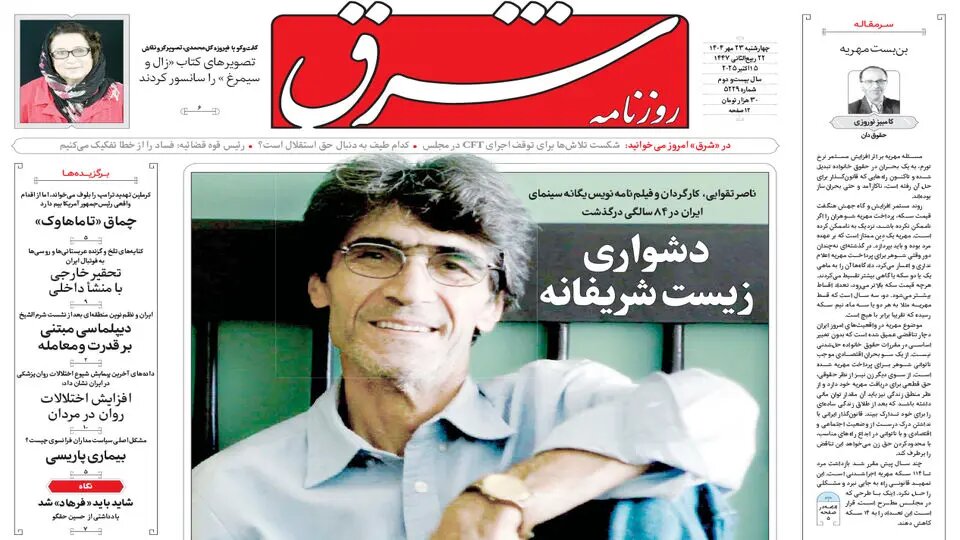Signs of a new change in Middle East

TEHRAN - Shargh devoted its headline to Trump's statements at the Sharm el-Sheikh summit and wrote: Trump said in his statements that he would like to lift sanctions on Iran when Tehran is ready to talk.
Trump's statements show that he is seeking to instill a new image of the regional order desired by Washington. In fact, his words can be seen as a reflection of the plan that the United States, relying on Arab coalitions, is seeking to redefine the balance of power in the Middle East. Trump's presence in Sharm el-Sheikh is, in fact, reminiscent of the traditional effort to shape a "new security architecture" in which Iran is viewed as disruptive or at least neutral. From this perspective, his insistence on "dialogue under sanctions" is a kind of reproduction of intelligent pressure aimed at forcing Tehran to be involved in a predetermined framework. Washington is trying to create a new equation in which the path of dialogue is pursued through Arab channels. Such a process, if it becomes a reality, could increase political and psychological pressure on Tehran.
Javan: Tehran-Moscow-Baku agreement to develop capacities of the North-South Corridor
Javan reviewed the trilateral meeting of Iran, Russia, and Azerbaijan regarding the International North-South Transport Corridor (INSTC). The newspaper argues that the three countries emphasized the expansion of cooperation in the fields of transportation, energy, and customs and decided to take a pragmatic approach to fully exploit the capacities of the North-South Transport Corridor; a route that, if its remaining section in Azerbaijan’s territory is completed, could pave the way for a transit boom from Russia to the Indian Ocean. In a situation where the importance of transit routes in the world is increasing, Iran, in cooperation with its regional partners, is trying to make the most of the new corridors and consolidate its geopolitical position in the global transit. The completion of the North-South Corridor brings significant benefits to Iran, Russia, and Azerbaijan. Being at the heart of this route, Iran can become a transit hub in the region and increase its foreign exchange earnings. The completion of this corridor will not only strengthen the economic and political cooperation of the three countries but also significantly enhance their role in the trade equations of Eurasia and South Asia.
Ham Mihan: The missing link of diplomatic initiative
In a note, Ham Mihan criticized Iran's absence from the Sharm el-Sheikh summit and wrote: While the nuclear negotiations and the process of pursuing diplomacy in this important national issue have reached an indisputable deadlock, attending this summit could have sent a different pulse. It could have opened new grounds for pursuing diplomatic path without the need to prepare the ground and spend a lot of time and money to restart a new round of negotiations, especially in the form of extensive pre-negotiation consultations. Whether we are in favor of negotiations with the West or against it, it cannot be hidden that in order to move forward in both directions, we need communication, cooperation, convergence, and the pursuit of dynamic diplomacy in the regional sphere and with neighboring countries. Iran's presence at the meeting could have been key to a new round of cooperation between Islamic states, because Iran's enemies, including Israel, have always depicted Iran as a rival pole and at odds with Islamic countries by promoting the Iranophobia project, and are trying to instill such image.
Khorasan: China's economic resilience can serve as model for Iran
Khorasan analyzed China's economic resistance in the face of the American pressure. It said: The technological war between China and the United States is a competition to define a share in the new world order. China's experience proves that within a sanctions-constrained environment, a state can strategically synthesize natural resources, technical expertise, and economic statecraft to repurpose restrictions as instruments of power. The message for Iran is also clear: confronting sanctions is not just economic. It also requires a smart combination of industrial policy, diversity of foreign relations, and technological independence. In this regard economic transparency and real planning for a knowledge-based economy as soon as possible are among the primary requirements. It should be noted that sanctions are not the end of the road; they are the beginning of a strategic game in which the winner is the one who turns limitations into opportunities with patience, planning, and intelligence. The technological confrontation between China and the United States and Beijing's experience in the face of external pressures is an instructive model for Iran to strengthen its economic resilience against sanctions by following smart policies.
